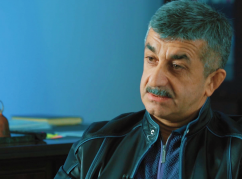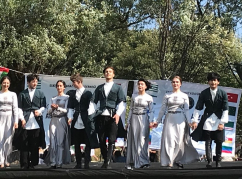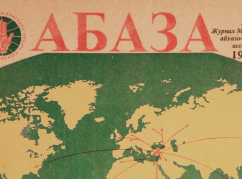The plenipotentiary representative of Abkhazia in Turkey, Vadim Kharazia, spoke in an interview with the WAC correspondent about the need to open a direct sea link between Abkhazia and Turkey, setting up a Turkish branch for issuing Abkhaz passports and the establishment of information policy.
Interview by Asta Ardzinba
- Vadim Nikolayevich, you have been working for six months as the Plenipotentiary Representative of Abkhazia in Turkey. The order of your appointment was signed by the President Raul Khadzhimba in June last year, but it was not immediately possible to begin the duties ...
- Exactly. The delay was due to the obstacles that the Georgian diplomats were causing in Turkey. However, this is not something new for us. In the end, already in August of the last year we together with my deputy Jansukh Lazba arrived in Istanbul and the work of the mission was resumed.
This is, first of all, the merit of the Federation of Abkhazian cultural centers in Turkey and the deputy of the Grand National Assembly - the Parliament of Turkey, the ethnic Abkhazian, Engin Taskuach-Ipa (Papba). Our numerous Diaspora in Turkey made every effort to create the conditions for the work of the Abkhaz mission, and the Turkish authorities had to listen to them. Today, the representation fully contributes to strengthening ties between the Diaspora and the historical homeland.
- What did you do first on arrival?
- After settling the issues with the documents, we held meetings with the leaders of the Abkhazfed, with the local Council of Elders (a traditional management institution consisting of the most respected and honored representatives of the community - ed.), with prominent representatives of the Diaspora. After that, we visited the cities where the Abkhaz-Abaza Diaspora is the most compact; in particular, we visited Mersin, a city located on the southeast coast of Turkey, Samsun and others.
One of the directions that the mission is conducting is the supervision of students from Abkhazia, who study here at universities. Therefore, meeting with them was one of the first steps we took.
Experience from the work with the Diaspora, of course, helps me a lot. I have been associated with it for many years, and I have a clear vision of the fact what the Diaspora represents itself and what it needs. It also happened that I had repeatedly visited Turkey with my compatriots many times before. That’s why the familiarization stage did not take much time.
The day before yesterday we were in the city of Bursa, where these days a congress of journalists from all over Turkey and another 22 countries is held. The organizers of the event asked me to speak at the opening of the congress. In my speech, I spoke about Abkhazia and the Abkhaz Diaspora, in particular about the role that the Abkhazians played in the formation and development of modern Turkey. I must say that interest in Abkhazia in Turkey is increasing every year.
We also actively cooperate with the Russian Embassy in Turkey. And when I arrived in Turkey, I met the Consul Geberal in Istanbul and he assured me of all-round support.
- What would you define as the primary tasks facing the Mission today?
- This is, first of all, the assistance to representatives of the Diaspora in obtaining Abkhaz passports and establishing a direct sea connection with Sukhum.
In the postwar period, when the country had the most difficult economic situation, when we were in a blockade, then the ship between Abkhazia and Turkey shuttled. This, undoubtedly, was the achievement of the first president of the republic, Vladislav Ardzinba. Today, when the republic has much more opportunities in the international arena, there is no sea communication. There should not be serious obstacles to this. It seems to me that the only question is how to work and make efforts to solve this problem. We intend to work actively in this direction.
Today you can get to Abkhazia only by plane through Sochi. Flights markedly increased in price in recent years; however, the financial side of the issue is not the only problem. In order to visit Russia, Turkish citizens are required to obtain a visa. To get a multiple transit visa, which is needed for a trip to Abkhazia, they need a document confirming that they are traveling to the Republic of Abkhazia. The question is about permission to enter the Republic of Abkhazia, an Abkhaz visa, or an internal passport of a citizen of the Republic of Abkhazia of the old standard. Far not all our compatriots can get passports on the first visit to their homeland. A second visit is again associated with the aforementioned difficulties. Therefore, the creation of accessible conditions for issuing passports to compatriots is another priority. We must fight for each of our people.
I propose to create an office in Turkey that will accept the documents of compatriots and send them to Abkhazia. Thus, the process of obtaining a passport will be launched, and the compatriot who has applied to us will be able to obtain a passport in an accelerated order upon arrival in Abkhazia. There are no obstacles for this kind of activity, but this is a step towards our Diaspora.
We must determine for ourselves how to build a policy in this area, and realize what an important role for the development of Abkhazia itself is played by its Diaspora throughout the world.
- What is required to solve these issues?
- First of all, we must understand that we need it. Awareness, that's what it takes. And then we will solve financial problems and look for acceptable ways of realizing these tasks.
In addition, we intend to support cultural centers in Turkey. It is through them that our people here are involved in the Abkhazian culture, the social life of Abkhazia; it is here that they study the Abkhaz language. The Ministry of Repatriation sends teachers to the centers, pays them salaries, this activity needs to be developed and involve more people.
Our common goal is to build bridges between Abkhazia and its Diaspora, to establish interaction, to involve in social processes.
In Abkhazia, there is a practice of gathering representatives of families, and so some of them hold such holidays from time to time, sometimes in Abkhazia and sometimes in Turkey. Choreographic groups began to travel to Abkhazia, children's summer camps in Abkhazia are planned to be held - all this leads to establishing contacts, and this is a necessary work.
I would like the society in Abkhazia to be friendlier to the representatives of the Diaspora and to the repatriates. Earlier, we held holidays in honor of the first repatriates, today in Abkhazia people are not eager to even get acquainted and meet their namesake who live in a foreign land. This is the way to nowhere. I'm not trying to blame anyone for anything; I'm trying to say that we do not have an ideology. And it is necessary to work in this direction. From my observations, I can say that we will save the Abkhaz culture and Apsuara only thanks to the Diaspora.
- What other practical steps should be taken to build bridges?
- The information policy needs to be adjusted. Today, up to ten Georgian channels operate in Turkey, but it is extremely difficult for local Abkhazians to get information about events in their homeland in the Abkhaz or Turkish languages.
At the same time, Abkhazia should also be aware of what is happening in the countries where the Diaspora resides. I was convinced of the need to open a news bureau in Turkey that would cover all the significant events of local Abkhazians and Abazins, tell about the life of our compatriots.
I want to add that the news about the transformation of the State Repatriation Committee into the Ministry was received with great enthusiasm. This reflects the importance of the process of repatriation and establishment of ties with the Diaspora. Let's hope that this is another significant step towards solving the problems that our compatriots living in different countries of the world face.
Итабуп Вадим Николаевич , нам есть на кого ровняться 👍. Ваше понимание остроты и путей решения вопросов диаспоры и народа Абаза , очень важны для нас .



to login or register.